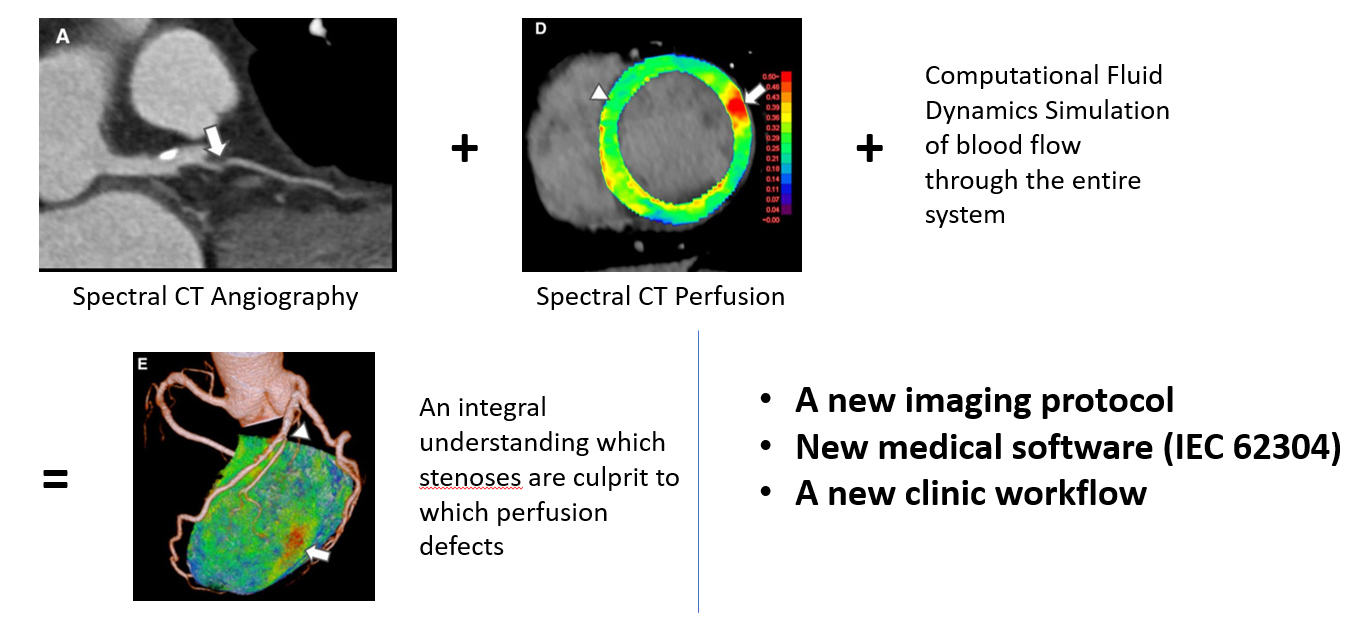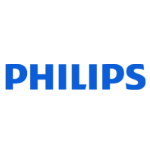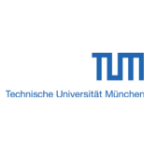Spectral CT myocardial perfusion imaging for lesion-specific intervention guidance
SMYPE will connect two types of imaging technologies to establish a better means of assessing coronary artery disease, which is the leading cause of death worldwide. Combining spectral CT myocardial perfusion and spectral CT coronary angiography as part of a clinically applicable imaging solution can reduce the need for invasive angiograms.
Origins
Coronary artery disease is the leading cause of death and a culprit in one in four premature deaths worldwide. Computed tomography (CT) myocardial perfusion imaging is becoming an important adjunct to standard coronary CT angiography for assessment of coronary artery disease, but the technology has limitations. SMYPE enables a breakthrough in cardiac computed tomography with a one-stop, non-invasive method for better evaluation of coronary artery stenosis and myocardial perfusion.
Team
The team Involves three centres of excellence: University Hospital rechts der Isar at TUM (MRI), led by Prof Daniela Pfeiffer MD, senior physician with a focus on cardiovascular imaging; Philips Research at the Multiphyics and Optics laboratory, Eindhoven (PNL), led by Marco Baragona, PhD; and Philips Research Medical X-ray Systems Hamburg, led by Sven Prevrhal, PhD: Project PI. The Philips business unit for Computed Tomography (Israel/USA) provides support.
The project
SMYPE seeks to improve CT in order to establish it as the imaging modality of choice for assessing coronary artery disease The addition of CT myocardial perfusion imaging to already established CT angiography lets physicians determine whether lesions are limiting blood flow in the coronary arteries, so doctors can better manage treatment and determine the need for revascularisation procedures.
SMYPE will provide a new hybrid imaging modality, combining cardiac CT based on a novel generation of dual-layer spectral CT devices with in-silico modelling techniques and computational fluid dynamics of the heart. The imaging makes it possible to model blood flow through the arterial tree and through the myocardium itself. This technology can give doctors lesion-specific intervention guidance.
The feasibility phase has already shown convincing results. EIT Health funding supports development of the industrialisation phase, which will address technology questions relevant for a successful product design, to allow for the product integration phase.
In order to deliver a clinically applicable and comprehensive spectral cardiac imaging solution, project participants will seek to: (1) Optimise rest/stress and dynamic spectral CT myocardial perfusion protocols and test for equivalence; (2) connect CT myocardial perfusion and CT coronary angiography into a combined, comprehensive exam; and (3) optimise workflow and protocols for the combined exams.

Impact
A combined coronary/myocardial exam can have a large societal impact. EU and US data show that roughly two-thirds of patients with suspected coronary artery disease who undergo invasive coronary angiograms actually do not have significant stenosis. This means there are many unnecessary catheterisations, which are expensive and carry risks for the patient. SMYPE will reduce unnecessary referrals to invasive coronary angiography by 15-65%, positively impacting patients’ quality of life while reducing healthcare costs.
Why this is an EIT Health project
This project is in keeping with the EIT Health focus Area of Improving Care Pathways because its improvement of diagnostic techniques for coronary artery disease, the most common cause of death worldwide, aids in prevention and improves treatment.
External Partners
- Philips Business Unit CT/AMI, Haifa, Israel and Cleveland, Ohio
- Philips Germany
CT myocardial perfusion imaging has the potential to identify ischaemia caused by non-obstructive CAD and microvascular disease.
From: ‘CT myocardial perfusion imaging: ready for prime time?’ in European Radiology
Partners

CLC/InnoStars: Belgium-Netherlands
Partner classification: Business
Partner type: Associate Partner
Philips Electronics Nederland B.V.
Philips Electronics Nederland B.V., Boschdijk 525, 5622 Eindhoven, Netherlands
Key Activities in Corporate Innovation
Med Tech, ICT






CLC/InnoStars: Germany
Partner classification: Education, Research, Tech Transfer, Clusters, Other NGOs, Hospital / University Hospital
Partner type: Core Partner
TUM is one of Europe's top Universities. It is committed to excellence in research and teaching, interdisciplinary education, and the active promotion of promising young scientists.
Technische Universität München (TUM)
Technische Universität München (TUM), Arcisstraße 21, 80333 München, Germany
Key Activities in Research and Developement
Biomedical engineering, Life Sciences, Social sciences / health economics, Clinical research
Key Activities in Business Creation
Incubation, Technology Transfer
Key Activities in Education
Entrepreneurship training, Technical faculties, Medical faculties



| Assistant Professor Radiology | Technical University of Munich (TUM)
Contact